
Journal of Transportation Engineering Part A-Systems
Scope & Guideline
Pioneering Research for Efficient and Sustainable Infrastructure
Introduction
Aims and Scopes
- Traffic Flow and Control Systems:
Research in this area focuses on optimizing traffic flow through advanced modeling, control strategies, and the implementation of intelligent transportation systems (ITS). This includes studies on traffic signal optimization, traffic incident detection, and dynamic traffic management. - Sustainable Transportation Solutions:
The journal emphasizes sustainable practices in transportation, including studies on electric and autonomous vehicles, public transportation systems, and the integration of green technologies to reduce environmental impacts. - Safety and Risk Assessment:
This area covers research aimed at improving road safety through the analysis of accident data, driver behavior, and safety performance measures. It includes methodologies for assessing crash risk and evaluating safety interventions. - Mobility and Accessibility Analysis:
Research in this scope examines the accessibility of transportation systems for various user groups, including studies on public transit, bike-sharing, and pedestrian infrastructure, focusing on enhancing mobility in urban environments. - Data Analytics and Machine Learning Applications:
The journal highlights the use of big data and machine learning techniques to analyze transportation systems, predict travel patterns, and enhance decision-making processes in transportation management.
Trending and Emerging
- Connected and Autonomous Vehicles (CAVs):
Research focusing on the integration of connected and automated vehicles into existing transportation systems is rapidly increasing. This includes studies on vehicle-to-everything (V2X) communication, safety implications, and the impact of CAVs on traffic flow. - Smart Mobility Solutions:
There is a growing emphasis on smart mobility, encompassing innovative transportation solutions that leverage technology, such as ride-sharing, mobility-as-a-service (MaaS), and the integration of various transport modes. - Data-Driven Decision Making:
The use of big data analytics for transportation planning and management is trending. Research exploring data-driven models for traffic prediction, demand forecasting, and real-time traffic management is becoming increasingly prominent. - Resilience and Sustainability in Transportation Systems:
Research exploring the resilience of transportation networks in the face of disruptions (e.g., natural disasters, pandemics) and the integration of sustainability in transportation planning is gaining momentum. - Behavioral Analysis of Transportation Users:
Emerging studies focusing on understanding user behavior, preferences, and decision-making processes in transportation systems are on the rise, particularly in the context of changing societal norms post-COVID-19.
Declining or Waning
- Traditional Traffic Engineering Models:
There has been a noticeable decline in the publication of papers focused solely on traditional traffic engineering models. As more researchers adopt advanced computational techniques and data-driven approaches, traditional methods are becoming less prominent. - Static Infrastructure Studies:
Research centered on static infrastructure, such as fixed traffic signals and conventional road designs, is receiving less attention. The shift towards dynamic and adaptive systems reflects the evolving nature of transportation technologies. - Manual Traffic Studies:
Papers that rely solely on manual data collection and observational studies are decreasing. The increasing reliance on automated data collection methods, such as sensors and machine learning, is rendering older methodologies less relevant.
Similar Journals

IEEE Open Journal of Intelligent Transportation Systems
Transforming Transportation Through Technology.IEEE Open Journal of Intelligent Transportation Systems, published by the IEEE-INST ELECTRICAL ELECTRONICS ENGINEERS INC, stands at the forefront of innovation in the realm of intelligent transportation systems since its inception in 2020. With its open-access format, this journal aims to disseminate groundbreaking research and technology advancements to a broader audience, fostering collaboration and knowledge exchange among professionals in the automotive, mechanical, and computer science engineering sectors. It boasts impressive Q1 rankings in Automotive Engineering, Computer Science Applications, and Mechanical Engineering as of 2023, highlighting its critical role in shaping the future of transportation technologies. The journal's exceptional standing is further evidenced by its Scopus rankings; it holds the 76th percentile in Mechanical Engineering and the 74th percentile in Automotive Engineering, making it a premier outlet for cutting-edge research. Researchers, professionals, and students seeking to navigate the evolving challenges and solutions in intelligent transportation systems will find this journal an invaluable resource.
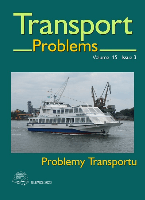
Transport Problems
Navigating the Intersection of Theory and Practice in TransportTransport Problems, published by the Silesian University of Technology, Faculty of Transport, is a distinguished open-access journal that has been advancing scholarship in the fields of Automotive Engineering, Mechanical Engineering, and Transportation since its inception in 2007. With an ISSN of 1896-0596 and an E-ISSN of 2300-861X, this journal serves as a vital platform for researchers and practitioners to disseminate innovative research findings and explore fundamental issues in transport systems and technologies. Based in Poland, the journal covers various topics including transportation logistics, vehicle dynamics, and environmental impacts, thereby addressing critical challenges faced in the transportation sector globally. As reflected in its Scopus rankings, the journal occupies respectable quartiles and continues to contribute valuable insights to the academic community. By making its content freely accessible, Transport Problems significantly enhances the ability of researchers and students alike to engage with the latest developments in transport engineering and contribute to this ever-evolving field.
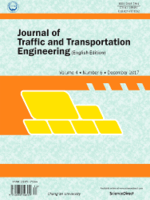
Journal of Traffic and Transportation Engineering-English Edition
Elevating Standards in Traffic and Transportation Research.Journal of Traffic and Transportation Engineering-English Edition, published by KEAI PUBLISHING LTD, is a leading open-access journal that has been disseminating valuable research in the realms of civil and structural engineering, as well as transportation studies since 2014. With a robust impact factor reflected by its prestigious Q1 rankings in both Civil and Structural Engineering and Transportation, this journal stands at the forefront of innovation and scholarship, featuring contributions from experts across the globe. The journal is particularly noted for its practical and theoretical advancements in traffic and transportation engineering, making it indispensable for researchers, industry professionals, and students aiming to deepen their understanding of these critical fields. Dedicated to providing a platform for high-quality interdisciplinary research, the Journal of Traffic and Transportation Engineering embraces the principles of open access, ensuring that all published articles are freely available to foster knowledge sharing and collaboration within the community. With its headquarters located in Beijing, China, the journal continues to push boundaries and set new standards in the field of traffic and transportation research.
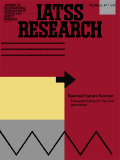
IATSS Research
Fostering collaboration for transformative safety solutions.IATSS Research, published by Elsevier Science Ltd, stands as a premier open-access journal at the intersection of engineering, safety research, urban studies, and transportation. Established in 2000, this esteemed journal caters to a diverse audience of researchers, industry professionals, and students eager to delve into innovative research that addresses pressing societal challenges. With an impressive impact factor and a consistent demonstration of high-quality scholarship, IATSS Research has achieved notable rankings within Scopus, including a top-tier position in Safety Research (Rank #13/109, 88th percentile) and Engineering (Rank #46/307, 85th percentile). The journal has evolved significantly since its inception, reflecting the dynamic nature of its converged fields from 2008 to 2024. By embracing open access, IATSS Research amplifies the reach of critical findings and fosters collaboration across disciplines, making it an invaluable resource for anyone invested in advancing knowledge and practices in modern engineering and urban safety.

Frontiers in Future Transportation
Driving Innovation in MobilityFrontiers in Future Transportation, published by FRONTIERS MEDIA SA, is an influential Open Access journal that has been at the forefront of research since its inception in 2020. With an ISSN of N/A and E-ISSN 2673-5210, this journal provides a comprehensive platform for cutting-edge studies in the field of transportation, encompassing urban studies, automotive engineering, and innovative control systems. Ranking impressively in Scopus with notable percentiles—61st in Urban Studies, 51st in Automotive Engineering, and others—it underscores its significance within the scholarly community. The journal is committed to advancing the discourse surrounding sustainable and smart transportation solutions that address the challenges of future mobility. By offering unrestricted access to research, it invites contributions from researchers, professionals, and students alike, fostering collaboration and disseminating knowledge pivotal to transforming transportation systems globally. With its headquarters based in Lausanne, Switzerland, Frontiers in Future Transportation is poised to make substantial contributions to the evolving landscape of transport research through 2024 and beyond.

Transportation Safety and Environment
Transforming transportation through safety and ecological insights.Transportation Safety and Environment is an esteemed open-access journal published by Oxford University Press, dedicated to advancing the field of transportation safety and environmental sustainability. Since its inception in 2019, the journal has rapidly gained recognition with an impressive Q2 category ranking in Control and Systems Engineering, Engineering (miscellaneous), and Safety, Risk, Reliability and Quality as of 2023. With an E-ISSN of 2631-4428, it provides a platform for high-quality research that addresses critical safety challenges and environmental impact within the transportation sector, covering a wide array of topics from vehicle safety measures to ecological considerations in transportation infrastructure. The journal’s open-access model promotes widespread distribution and accessibility of research findings, enabling researchers, professionals, and students to engage with the latest advancements and contribute to future developments in the field. Located in the heart of the United Kingdom at Great Clarendon St, Oxford OX2 6DP, England, Transportation Safety and Environment stands at the forefront of fostering innovative solutions for safer and more sustainable transportation practices worldwide.
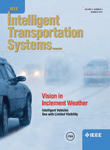
IEEE Intelligent Transportation Systems Magazine
Leading the Charge in Automotive Engineering InsightsIEEE Intelligent Transportation Systems Magazine, published by the IEEE-Institute of Electrical and Electronics Engineers Inc., is a leading journal in the fields of automotive engineering, computer science applications, and mechanical engineering. With an impressive impact factor reflected in its 2023 rankings, this journal sits in the top quartile (Q1) across multiple engineering categories, making it an essential resource for researchers and professionals dedicated to advancing the intelligent transportation systems landscape. The magazine covers a diverse array of topics from vehicle technology innovations to traffic management solutions, aimed at improving transportation efficiency, safety, and sustainability. Since its inception in 2009, the publication has established a solid reputation for disseminating cutting-edge research and practical applications in intelligent transportation, all while remaining an accessible resource for academic and industrial stakeholders alike. Subscribe today to stay at the forefront of transformative transportation technologies!
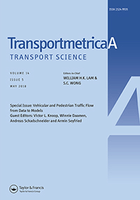
Transportmetrica A-Transport Science
Transforming Transportation Knowledge into ActionTransportmetrica A-Transport Science, published by Taylor & Francis Ltd, is an influential journal at the forefront of transport science research. With an ISSN of 2324-9935 and an E-ISSN of 2324-9943, the journal spans a diverse range of topics within the field of transportation and engineering. Since its inception in 2013, it has aimed to provide a platform for high-quality, innovative research, reflecting significant advancements and challenges in transportation systems. Recognized for its academic rigor, it has achieved a Q1 ranking in Engineering (miscellaneous) and a Q2 ranking in Transportation for 2023, reflecting its impact and relevance in these fields. With impressive Scopus rankings of #31/307 in General Engineering and #31/141 in Transportation, the journal is positioned in the top 90th and 78th percentiles respectively. Though not an open-access publication, Transportmetrica A promotes accessibility of knowledge and strives to foster discourse among researchers, professionals, and students alike, making it an essential resource for anyone invested in the future of transportation science.

Vehicles is a pioneering open access journal published by MDPI since 2019, dedicated to advancing knowledge in the fields of Automotive Engineering and Electrical and Electronic Engineering. Based in Switzerland, the journal provides a valuable platform for researchers, professionals, and students to disseminate high-quality, peer-reviewed research across essential areas of vehicle technology and innovation. With an impressive Q2 ranking in both Automotive Engineering and Electrical and Electronic Engineering as of 2023, and a notable placement in the Scopus rankings (Rank #37/125 and #320/797, respectively), Vehicles plays a critical role in fostering collaboration and knowledge exchange within these fast-evolving disciplines. Through its commitment to Open Access, Vehicles ensures that cutting-edge research is accessible to a global audience, thereby contributing significantly to the collective understanding and development of sustainable transportation solutions. Situated at the crossroads of engineering innovation and practical application, Vehicles invites contributions that explore contemporary challenges and promote transformative advancements in the automotive sector.

Jordan Journal of Civil Engineering
Pioneering Insights for Structural ExcellenceThe Jordan Journal of Civil Engineering, ISSN 1993-0461 and E-ISSN 2225-157X, serves as a pivotal platform for research dissemination in the field of civil engineering. Published by Jordan University of Science & Technology, this journal has established itself as a vital resource since its inception in 2007 and continues to impact the academic community with its wide-ranging scope covering innovative practices and cutting-edge research in civil and structural engineering. Holding a respectable Q3 ranking in the 2023 category, with Scopus positioning it at rank #235 out of 379, the journal reflects growing recognition within its discipline. Although currently not an open-access publication, it provides essential insights that can benefit researchers, industry professionals, and students seeking to contribute to advancements in civil engineering through rigorous scholarly articles and studies up to 2024. Its commitment to high academic standards enhances the relevance and importance of its contributions to both local and global engineering practices.